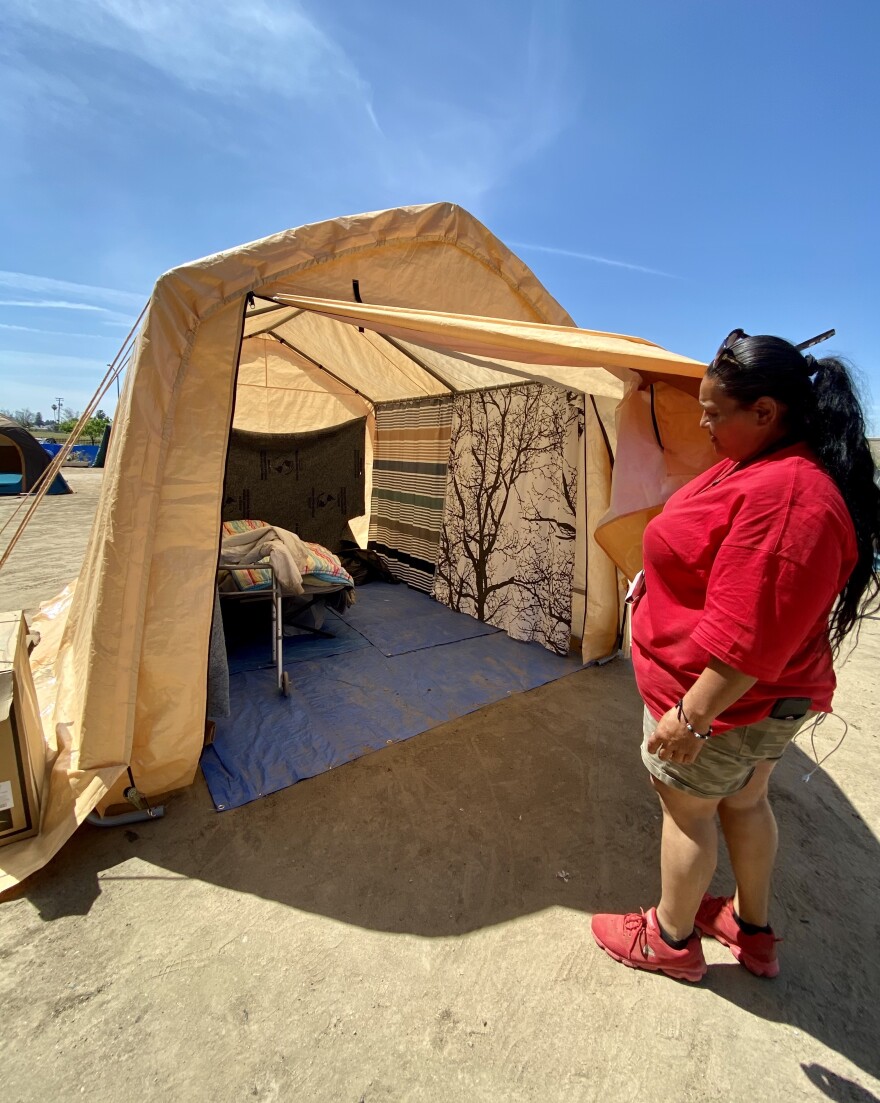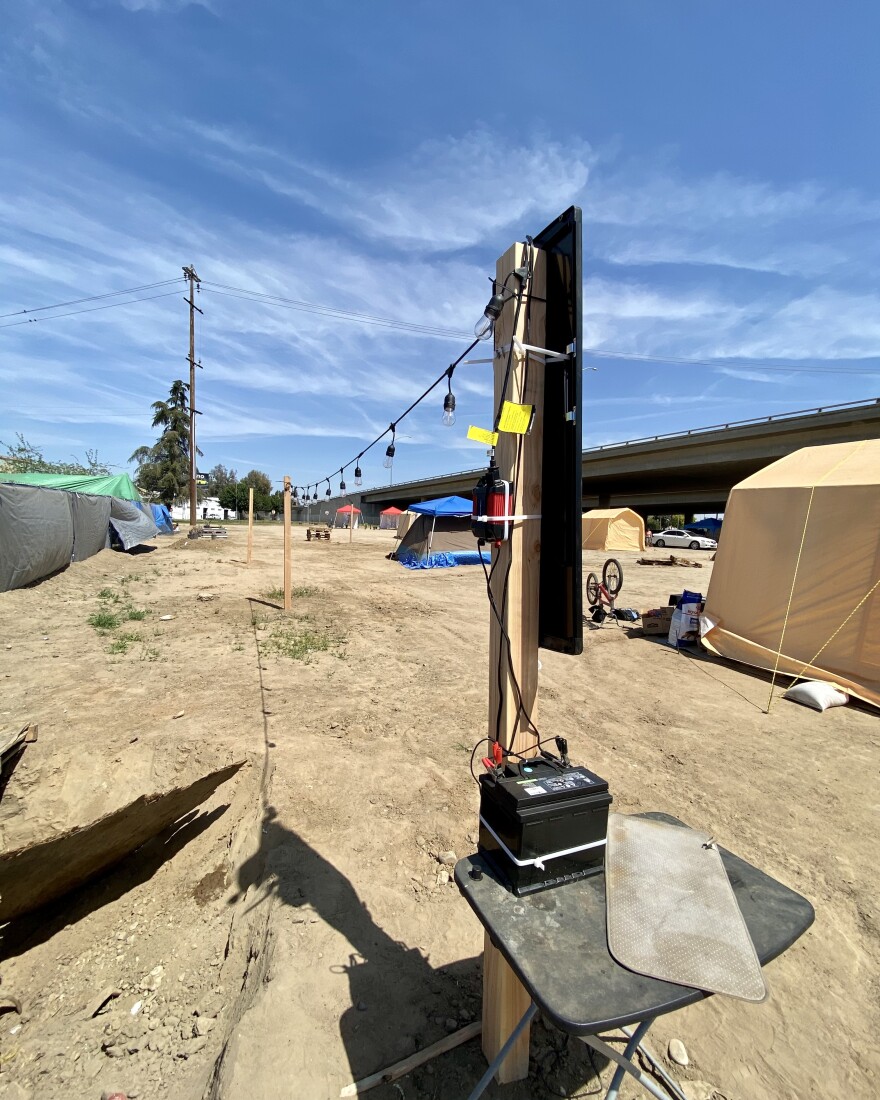An encampment at Broadway and San Benito in downtown Fresno is dotted with rows of tents. Many are the newly built and more sturdy tent sheds.
Camp manager Dez Martinez unzips a tent belonging to one of the newest residents, Norma Chapa, who has been here for three weeks.
“I have some books for coloring using colored pens, and I have my stuffed animals and this is how I made my room,” Norma, 52, says, showing off what’s inside.
Chapa has been homeless for eight years. She suffered a stroke in December. She began looking for a new place after she says the person she was living with became physically abusive.
She was dropped off at the encampment and accepted a spot that opened up. When she first arrived, she needed her walker and some assistance to move around. But after a week and a half, she was walking on her own.
“I’m still, you know, with the walker sometimes,” she says looking down at her feet. “That's only if my leg gets tired, but other than that, I’m walking without a walker. It’s great, it’s fun.”
Martinez, who runs this camp as part of her non-profit We Are Not Invisible, says Chapa credits the stable environment at the safe camp for her recovery.
“She told me, ‘It’s because I’m here, because I get sleep now, because I’m not assaulted, and because I get food.’ She’s like, ‘I’m getting better.’”

A total of eight tent sheds like Norma’s are now up at the camp and Martinez is planning to buy more.
“That’s from the blessings of the financial contributions, because four of them are $700,” she says.
The contributions came from donors who wanted to help after they heard people who had been displaced from a highway encampment moved into Martinez’ camp. Donations were also used to add long strings of lights. They’re powered by a solar panel, hooked up to an inverter and a car battery. Martinez says the residents are the ones who came up with the lighting system.
“They’re teaching me how to hook this up, how many watts I need for a solar panel and what kind of appliances I can hook to it,” she says.
Single posts with solar powered lights are also erected in between rows of tents, like makeshift lamp posts that are motion detected. But safety is still Martinez’ main concern. People camped outside the perimeter sometimes start arguments with camp residents and get involved with illegal activities at night.
H. Spees, director of Fresno Housing and Homeless Initiatives recently spoke with Martinez about the issues at her camp.
“Creating these environments can be costly in terms of money, staff, time and effort. And these environments can prove difficult to manage and maintain as Dez has experienced,” he says.
Although he thinks encampments aren’t a long-term solution, he says he’ll ask the council next week to increase police patrols in the area.

He’ll also recommend purchasing mobile showers, washing stations and portable toilets to use at multiple encampments on a rotation.
He says the city will do what it can to ensure that public safety and sanitation is provided, but Spees views the encampments as a community-wide issue and donations as a solution to fill in gaps where the city can’t.
Spees says the city will invest most of its resources and federal funds towards a more permanent solution to build hundreds of new affordable housing units. Right now, Spees says Fresno is about 35,000 affordable housing units short.
Dr. Margot Kushel, professor of medicine and director of the UCSF Center for Vulnerable Populations says lack of housing is a problem across California.
“There is a shortage of housing in California of about a million units across the state, of units that are affordable and available for extremely low income renters. That is a huge structural problem that we need to fix,” she says.
In fact, she says California has the largest population of people experiencing homelessness in the country. About 150,000 people are homeless every night in California.
Some cities have actually sanctioned encampments during this homelessness crisis. That can mean anything from acknowledging the camp operations to adding staff and resources.
Kushel says San Francisco has spent a lot on encampments and it’s been controversial.
“I think the problem was that they were very expensive. So, suddenly you're spending all of this money to keep people in a parking lot or on a sidewalk,” she says.
But with the lack of affordable housing options, Kushel says she’s come to reluctantly support sanctioned encampments.
“I think in some ways, it’s an acknowledgement of our failure and that in some ways, we do need to make sure that people who are outside have basic hygiene,” she says.
Although Martinez sees her encampment as a temporary solution, she says it helps people make progress toward a better life.
“I could have 50 people and if I have 10 successful people turn their life around, it’s worth it to me. Because those 10 individuals deserve a chance also,” she says.
The city council will discuss recommendations for the encampments at the next meeting, April 22.




